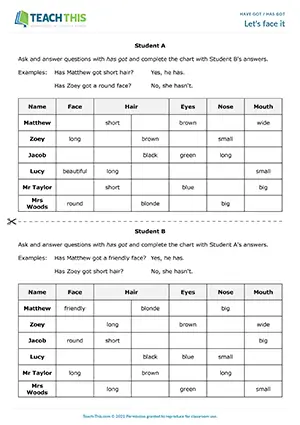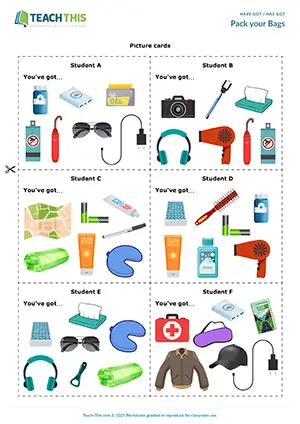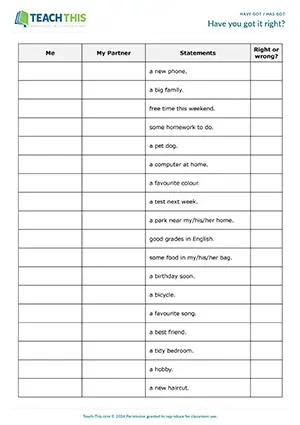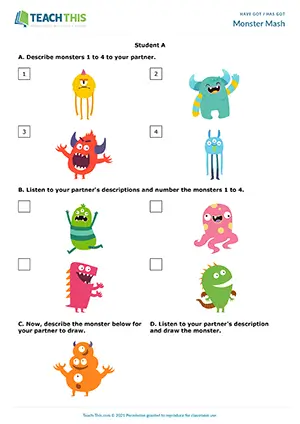Have got & Has got ESL Games, Activities & Worksheets
Emma's School Timetable

ESL Has got Activity - Speaking: Information Gap, Asking and Answering Questions, Controlled Practice - Pair Work
In this 'has got' information gap activity, students race to complete missing subjects in a school timetable by asking and answering questions with 'has got'. In pairs, students take turns asking and answering...
Have a Guess

ESL Have and Has Game - Grammar and Speaking: Sentence Completion, Guessing, Asking and Answering Questions - Pair Work
This 'have got' and 'has got' guessing game helps students practice 'have got' and 'has got' in affirmative and negative sentences and 'Have you got...?' questions. First, students read each item on the...
Have Got Battleships

ESL Have got and Has got Game - Grammar: Asking and Answering Questions - Pair Work
Here is an engaging 'have got' and 'has got' game to help students practice forming and answering 'have got' and 'has got' questions with short answers. Students begin by marking five ships on their battleships grid. Students then use the...
Have got or has got?

ESL Have got and Has got Worksheet - Grammar Exercises: Categorising, Matching, Rewriting Sentences - Speaking Activity: Information Gap - Pair Work
In this free 'have got' and 'has got' worksheet, students learn and practice how to use 'have got' and 'has got' in affirmative and negative sentences, questions and...
Let's face it

ESL Has got Activity - Speaking: Information Gap, Freer Practice - Pair Work
In this 'has got' activity on physical appearance, students ask and answer questions using 'has got' and complete a chart that describes the facial features of several people. In pairs, students take turns asking questions with 'has got'...
Pack your Bags

ESL Have you got Game - Grammar and Speaking: Asking and Answering Questions, Freer Practice - Group Work
In this rewarding 'Have you got...?' game, students race to find items they need for a holiday by asking and answering 'Have you got...?' questions. Each student has a picture card and a corresponding item...
What do we look like?

ESL Have got Game - Grammar and Speaking: Forming Sentences - Group Work
In this entertaining 'have got' game, students use word cards to build and read true sentences about their own and their classmates' physical appearance using affirmative and negative forms of 'have got' and 'has got'. The aim of...
What have you got in your bag?

ESL Have got and Has got Activity - Grammar and Speaking: Matching, Listing, Forming Sentences, Sentence Completion - Pair Work
In this useful 'have got' and 'has got' activity, students learn and use vocabulary for everyday bag items and talk about what they and their partner have and haven’t got using 'some' and 'any'. First...
Find Out

ESL Have You Got Activity - Grammar and Speaking: Asking and Answering Questions, Forming Sentences, Freer Practice
In this insightful 'have got' activity, students find out what their classmates have by asking 'Have you got...?' questions, tallying yes answers and reporting their findings. The students' task is to find...
Find Someone Who's Got...

ESL Have got and Has got Activity - Grammar and Speaking: Forming, Asking and Answering Questions, Freer Practice
Here is a free 'have got' activity where students survey their classmates by asking 'Have you got' questions and then report what they found using 'has got'. Students start by going through the items on...
Have got: Wh Questions

ESL Have got Wh Questions Game - Grammar and Speaking: Forming, Asking and Answering Questions - Group Work
In this productive 'have got' game, students use word cards to build and ask as many Wh questions with 'have got' and 'has got' as they can. Each word can be used more than once and singular nouns can be...
Have you got it right?

ESL Have got Game - Grammar and Speaking: Sentence Completion, Guessing, Asking and Answering Questions - Pair Work
This fun 'have got' game helps students practice forming statements, questions and short answers with 'have got'. First, students read each item and write 'I have(n't) got' in the column marked 'Me'...
Monster Mash

ESL Has got Activity - Grammar, Listening and Speaking: Describing, Matching, Drawing - Pair Work
In this amusing 'has got' and 'hasn't got' activity, students describe monsters to a partner using 'has got' and 'hasn't got' to talk about appearance. One student goes first and describes monster number 1...
Have you got a house for rent?

ESL Have got and Has got Worksheet - Reading and Grammar Exercises: Identifying, Writing Sentences, Sentence Completion
This comprehensive 'have got' and 'has got' worksheet helps students review the affirmative and negative forms of 'have got' and 'has got' in the context of housing ads. First, students read....
Here's what our members are saying...
